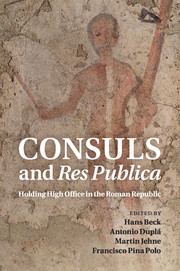Book contents
- Frontmatter
- Contents
- Preface
- Contributors
- The republic and its highest office: some introductory remarks on the Roman consulate
- Part I The creation of the consulship
- Part II Powers and functions of the consulship
- Chapter 4 Consular power and the Roman constitution: the case of imperium reconsidered
- Chapter 5 Consuls as curatores pacis deorum
- Chapter 6 The Feriae Latinae as religious legitimation of the consuls’ imperium
- Chapter 7 War, wealth and consuls
- Part III Symbols, models, self-representation
- Part IV Ideology, confrontation and the end of the republican consulship
- Bibliography
- Index of persons
- Subject index
Chapter 5 - Consuls as curatores pacis deorum
from Part II - Powers and functions of the consulship
Published online by Cambridge University Press: 07 September 2011
- Frontmatter
- Contents
- Preface
- Contributors
- The republic and its highest office: some introductory remarks on the Roman consulate
- Part I The creation of the consulship
- Part II Powers and functions of the consulship
- Chapter 4 Consular power and the Roman constitution: the case of imperium reconsidered
- Chapter 5 Consuls as curatores pacis deorum
- Chapter 6 The Feriae Latinae as religious legitimation of the consuls’ imperium
- Chapter 7 War, wealth and consuls
- Part III Symbols, models, self-representation
- Part IV Ideology, confrontation and the end of the republican consulship
- Bibliography
- Index of persons
- Subject index
Summary
In his reflections on the republican constitution, Polybius emphasizes the power of the consuls as typical of a monarchical government. According to the Greek author, consuls were, on the one hand, commanders-in-chief of the Roman army with full decision-making powers, and as such, spent long parts of the year away from Rome. On the other hand, during their stay in Rome, before taking command of the legions, the consuls were the heads of the Roman administration. In this sense, Polybius mentions a series of tasks assigned to them involving both the senate and the people. Paradoxically, Polybius does not mention the religious duties performed by the consuls, despite the fact that some of these functions were compulsory for them and that their fulfilment was, according to Roman belief, of great importance to the welfare of the community.
In fact, the religious duties performed by the consuls during the first few weeks in office were among their most important functions. Roman religion was national and civic, and its practice was a political issue since it concerned the entire civitas. Most religious activities were performed in public, according to stringent rules, and their main purpose was to maintain or to restore the pax deorum. There were experts grouped into various priestly collegia who served as essential, qualified advisers, but the management of religious affairs was in the hands of the senate and the maintenance of the direct relationship between the community and the gods was assigned to the magistrates, particularly to the consuls as supreme magistrates of the civitas.
- Type
- Chapter
- Information
- Consuls and Res PublicaHolding High Office in the Roman Republic, pp. 97 - 115Publisher: Cambridge University PressPrint publication year: 2011
- 3
- Cited by



